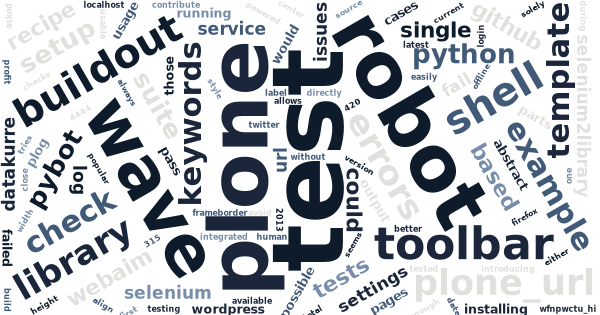Stay accessible – Robot Framework library for WAVE-toolbar
WAVE Web Accessibility Tool is a popular service for detecting accessibility issues on your websites. WAVE Toolbar is an offline version of the service, distributed as a downloadable, self-installable, Firefox add-on. Both the service and the toolbar are produced and copyrighted by WebAIM a US based non-profit organization, but are usable without cost.
During the last PLOG I was asked by Paul, if it would be possible to automate WAVE Toolbar -powered accessibility checks with Robot Framework (and its Selenium-library). Luckily, it seems to be:
robotframework-wavelibrary
WAVELibrary is a new Robot Framework library, packaged as robotframework-wavelibrary, to provide keywords for executing WAVE Toolbar accessibility analysis directly withing Robot Framework tests.
Together with the Selenium-library, it allows you to prepare any test situation on your web product (e.g. login and open some form), execute WAVE-analysis and either pass or fail the test according to the results. And those tests can also be integrated with your CI to avoid accidentally introducing new accessibility issues.
WAVELibrary is open source, so if its current features are not enough, thanks to Robot Framework syntax, you can easily contribute and make it better.
(Please, note that you should not solely rely only on WAVE Toolbar for validating your products accessibility, because accessibility should always be verified by a human. Yet, WAVE Toolbar could assist you on detecting possible accessibility issues, WAVELibrary could help in automating that, and once you are accessible, WAVE Toolbar and WAVELibrary together can help you to stay accessible.)
Basic usage
./bootstrap.py
$ curl -O http://downloads.buildout.org/2/bootstrap.py./buildout.cfg
[buildout]
parts = pybot
[pybot]
recipe = zc.recipe.egg
eggs =
robotframework
robotframework-wavelibrary./example.robot
*** Settings ***
WAVELibrary
Open WAVE browser
Close all browsers
*** Test Cases ***
Test single page
Single page test could interact with the target
... app as much as required and end with triggering
... the accessibility scan.
Go to http://www.plone.org/
Check accessibility errors
Test multiple pages
Template based test can, for example, take a list
... of URLs and perform accessibility scan for all
... of them. While regular test would stop for the
... first failure, template based test will just jump
... to the next URL (but all failures will be reported).
Check URL for accessibility errors
http://www.plone.org/
http://www.drupal.org/
http://www.joomla.org/
http://www.wordpress.org/See also all the available keywords. (in addition to robot keywords and selenium keywords).
Installing
$ python bootstrap.py
$ bin/buildoutRunning
$ bin/pybot example.robot
==============================================================================
Example
==============================================================================
Test single page :: Single page test could interact with the target | PASS |
------------------------------------------------------------------------------
Test multiple pages :: Template based test can, for example, take ... | FAIL |
Wave reported errors for http://wordpress.org/: ERROR: Form label missing !=
------------------------------------------------------------------------------
Example | FAIL |
2 critical tests, 1 passed, 1 failed
2 tests total, 1 passed, 1 failed
==============================================================================
Output: /.../output.xml
Log: /.../log.html
Report: /.../report.htmlIn addition to generated Robot Framework test report and log, there should be WAVE Toolbar -annotated screenshot of each tested page and WAVELibrary also tries to take a cropped screenshot of each visible accessibility error found on the page.
Plone usage
While WAVELibrary has no dependencies on Plone, it’s tailored to work well with plone.app.robotframework so that it’s easy to run accessibility test against sandboxed test instance.
./bootstrap.py
$ curl -O http://downloads.buildout.org/2/bootstrap.py./buildout.cfg
[buildout]
extends = http://dist.plone.org/release/4.3-latest/versions.cfg
parts = robot
[robot]
recipe = zc.recipe.egg
eggs =
plone.app.robotframework
robotframework-wavelibrary./plone.robot
*** Settings ***
WAVELibrary
plone/app/robotframework/server.robot
Setup
Teardown
*** Variables ***
${START_URL} about:
*** Keywords ***
Setup
Setup Plone site plone.app.robotframework.testing.AUTOLOGIN_ROBOT_TESTING
Import library Remote ${PLONE_URL}/RobotRemote
Enable autologin as Site Administrator
Set autologin username test-user-1
Teardown
Teardown Plone Site
*** Test Cases ***
Test Plone forms
Check URL for accessibility errors
${PLONE_URL}/@@search
${PLONE_URL}/folder_contents
${PLONE_URL}/@@personal-information
${PLONE_URL}/@@personal-preferences
Test new page form tabs
Check new page tabs for accessibility errors
default
categorization
dates
creators
settings
*** Keywords ***
Check new page tabs for accessibility errors
${fieldset}
Go to ${PLONE_URL}/createObject?type_name=Document
${location} = Get location
Go to ${PLONE_URL}
Go to ${location}#fieldsetlegend-${fieldset}
Check accessibility errorsInstalling
$ python bootstrap.py
$ bin/buildoutRunning
$ bin/pybot plone.robotOne more thing…
What about recording those test runs?
-
Get VirtualBox and Vagrant.
-
Get and build my Robot Recorder kit:
$ git clone git://github.com/datakurre/robotrecorder_vagrant.git $ cd robotrecorder_vagrant && vagrant up && cd .. -
Figure out your computer’s local IP…
-
Record the previously described Plone-suite:
$ ZSERVER_HOST=mycomputerip bin/pybot -v ZOPE_HOST:mycomputerip -v REMOTE_URL:http://localhost:4444/wd/hub plone.robot
The recording is saved in ./robotrecorder_vagrant/recordings.
